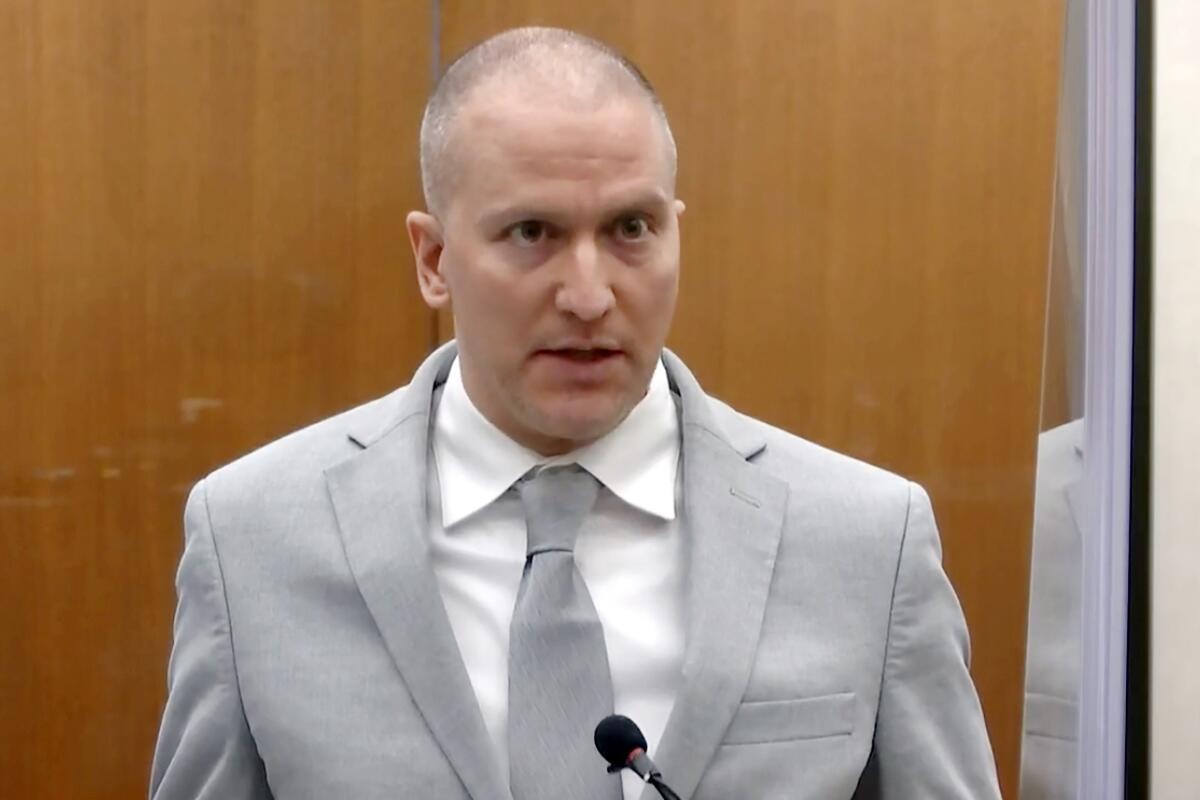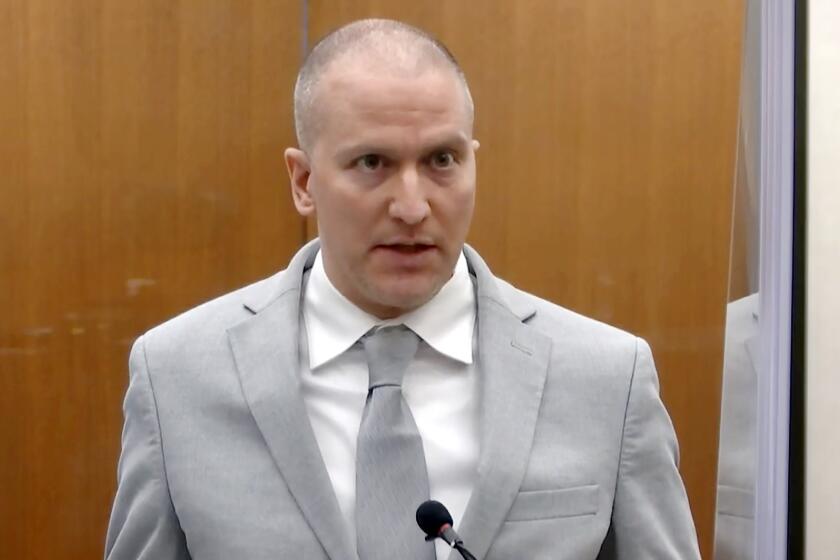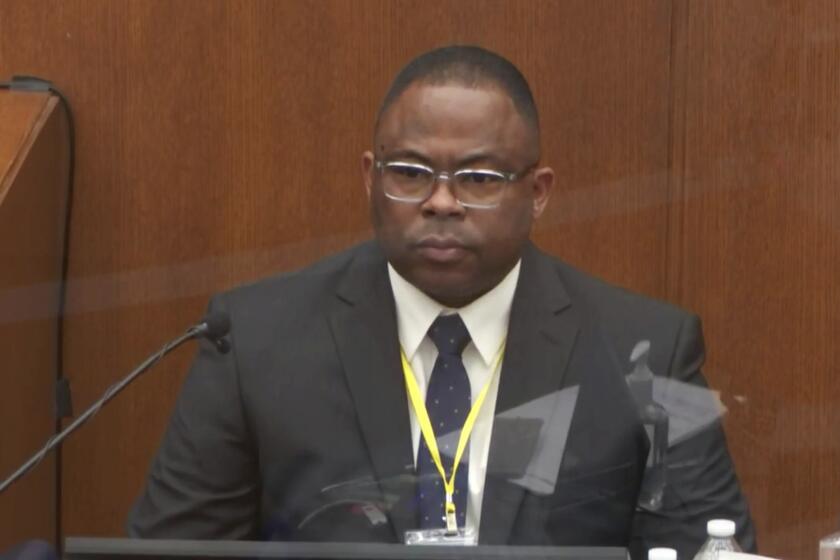Inmate charged with stabbing Derek Chauvin is ex-Mexican Mafia L.A. gang leader, prosecutors say

- Share via
Derek Chauvin was stabbed in prison 22 times by a former gang leader and onetime FBI informant who told investigators he targeted the ex-Minneapolis police officer because of his notoriety for murdering George Floyd, according to federal prosecutors.
John Turscak is charged with attempted murder after the Nov. 24 attack at the Federal Correctional Institution in Tucson. He told correctional officers he would have killed Chauvin had they not responded so quickly, prosecutors said.
Turscak, who is serving a 30-year sentence for crimes committed while a member of the Mexican Mafia gang in Los Angeles, told investigators he thought about attacking Chauvin for about a month because he is a high-profile inmate, but denied wanting to kill him, prosecutors said.
Turscak is accused of attacking Chauvin with an improvised knife in the prison’s law library around 12:30 p.m. on Nov. 24, the day after Thanksgiving. Correctional officers used pepper spray to subdue Turscak, prosecutors said Friday. The Bureau of Prisons said employees performed “life-saving measures.” Chauvin was taken to a hospital for treatment.
Former police officer Derek Chauvin’s second-degree murder conviction for the killing of George Floyd is upheld by the Minnesota Court of Appeals.
Turscak told FBI agents interviewing him after the assault that he attacked Chauvin on Black Friday as a symbolic connection to the Black Lives Matter movement, which garnered widespread support in the wake of Floyd’s murder in 2020, and the “Black Hand” symbol associated with the Mexican Mafia, prosecutors said.
In addition to attempted murder, Turscak, 52, is charged with assault with intent to commit murder, assault with a dangerous weapon and assault resulting in serious bodily injury. The attempted murder and assault with intent to commit murder charges are each punishable by up to 20 years in prison. Turscak is scheduled to complete his current sentence in 2026.
A lawyer for Turscak was not listed in court records. Turscak has represented himself from prison in numerous court matters. After the stabbing, he was moved to an adjacent federal penitentiary in Tucson.
Former Minneapolis Police Officer Derek Chauvin has been fatally stabbed by another inmate at a federal prison in Arizona, where he’s serving time for the murder of George Floyd
Turscak led a faction of the Mexican Mafia in the Los Angeles area in the late 1990s, going by the nickname “Stranger,” according to court records. He became an FBI informant in 1997, providing information about the gang and recordings of conversations he had with its members and associates.
The investigation led to more than 40 indictments. But about midway through, the FBI dropped Turscak as an informant because he was still dealing drugs, extorting money and authorizing assaults. According to court papers, Turscak plotted attacks on rival gang members and was accused of attempting to kill a leader of a rival Mexican Mafia faction while also being targeted himself.
Turscak pleaded guilty in 2001 to racketeering and conspiring to kill a gang rival and said he thought his cooperation with the FBI would have earned a lighter sentence.
On Friday, messages seeking comment were left with Chauvin’s lawyers. His mother, Carolyn Runge Pawlenty, did not immediately respond to a Facebook message.
In a post earlier that day, Pawlenty said prison officials had told her that Chauvin was in stable condition but were otherwise not forthcoming with details about the assault or his injuries. The Bureau of Prisons said it gave updates to everyone Chauvin asked be notified.
Chauvin, 47, was sent to FCI Tucson from a maximum-security Minnesota state prison in August 2022 to simultaneously serve a 21-year federal sentence for violating Floyd’s civil rights and a 22½-year state sentence for second-degree murder.
Chauvin’s lawyer at the time, Eric Nelson, had advocated for keeping him out of general population and away from other inmates, anticipating he would be a target. In Minnesota, Chauvin was mainly kept in solitary confinement “largely for his own protection,” Nelson wrote in court papers last year.
Last month, the U.S. Supreme Court rejected Chauvin’s appeal of his murder conviction. Separately, Chauvin is making a long-shot bid to overturn his federal guilty plea, claiming new evidence shows he didn’t cause Floyd’s death.
Floyd, who was Black, died on May 25, 2020, after Chauvin, who is white, pressed a knee on his neck for 9½ minutes on the street outside a convenience store where Floyd was suspected of trying to pass a counterfeit $20 bill.
A use-of-force expert said Derek Chauvin had his knee on George Floyd’s neck the entire time he was handcuffed and lying facedown.
Bystander video captured Floyd’s fading cries of “I can’t breathe.” His death touched off protests worldwide, some of which turned violent, and forced a national reckoning with police brutality and racism.
Three other former officers who were at the scene received lesser state and federal sentences for their roles in Floyd’s death.
Chauvin’s stabbing comes as the federal Bureau of Prisons has faced increased scrutiny in recent years after the beating death of James “Whitey” Bulger in 2018 and wealthy financier Jeffrey Epstein’s jail suicide in 2019.
The attack on Chauvin was the third incident involving a high-profile federal prison inmate in the last six months. Disgraced former sports doctor Larry Nassar was stabbed in July at a federal penitentiary in Florida and “Unabomber” Ted Kaczynski killed himself at a federal medical center in June.
An ongoing Associated Press investigation has uncovered deep, previously unreported flaws within the Bureau of Prisons, the Justice Department’s largest law enforcement agency with more than 30,000 employees, 158,000 inmates and an annual budget of about $8 billion.
AP reporting has revealed rampant sexual abuse and other criminal conduct by staff, dozens of escapes, chronic violence, deaths and severe staffing shortages that have hampered responses to emergencies, including inmate assaults and suicides.
More to Read
Sign up for Essential California
The most important California stories and recommendations in your inbox every morning.
You may occasionally receive promotional content from the Los Angeles Times.
















